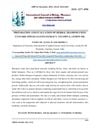 1 citations,
March 2023 in “Clinical, Cosmetic and Investigational Dermatology”
1 citations,
March 2023 in “Clinical, Cosmetic and Investigational Dermatology” Current treatments for Alopecia Areata have mixed success, and there's a need for better, more accessible options and support for affected individuals.
9 citations,
June 2020 in “Trials” The trial aims to test if spironolactone is an effective acne treatment for women without the side effects of current treatments.
 6 citations,
February 2023 in “Advances in Therapy”
6 citations,
February 2023 in “Advances in Therapy” Baricitinib, a drug for rheumatoid arthritis, atopic dermatitis, and alopecia areata, is generally safe with low risk of major side effects, even in patients with risk factors. It's also effective in promoting hair regrowth in alopecia areata patients.
May 2024 in “IntechOpen eBooks” More oxygen isn't always better and can sometimes be worse.
 November 2023 in “ACS Omega”
November 2023 in “ACS Omega” New liposome treatment successfully delivers CRISPR to deactivate a key enzyme in androgen-related disorders.
 58 citations,
November 2013 in “Journal of Innovative Optical Health Sciences”
58 citations,
November 2013 in “Journal of Innovative Optical Health Sciences” Multiphoton microscopy is a promising tool for detailed skin imaging and could improve patient care if its challenges are addressed.
 1 citations,
March 2019 in “Journal of AOAC INTERNATIONAL”
1 citations,
March 2019 in “Journal of AOAC INTERNATIONAL” New method quickly and accurately measures dexpanthenol in hair products.
 October 2023 in “Paediatrics & child health”
October 2023 in “Paediatrics & child health” The document advises health care providers on how to support transgender and gender-diverse youth with appropriate care and referrals.
April 2020 in “The journal of investigative dermatology/Journal of investigative dermatology” Certain surgical methods are better than routine incision for hidradenitis suppurativa, topical clindamycin and acitretin are effective treatments, men with HS have a risk of skin cancer, HS patients are more likely to die from heart problems, and specific genetic markers are linked to treatment response.
 21 citations,
March 2019 in “Journal of The American Academy of Dermatology”
21 citations,
March 2019 in “Journal of The American Academy of Dermatology” The review highlights the need for more research on transgender dermatology, the role of dermatologists in gender affirmation, and the effects of hormone therapy on skin and hair.
 6 citations,
July 2017 in “Clinics in Plastic Surgery”
6 citations,
July 2017 in “Clinics in Plastic Surgery” The document concludes that individualized reconstruction plans are essential for improving function and appearance after head and neck burns.
 4 citations,
June 2013 in “The Journal of Rheumatology”
4 citations,
June 2013 in “The Journal of Rheumatology” The document concludes that various findings in rheumatology offer insights into disease severity, treatment responses, and potential risks in medication, with some limitations due to unspecified participant numbers.

Plant-based compounds can improve wound dressings and skin medication delivery.
 86 citations,
May 2013 in “American journal of obstetrics and gynecology”
86 citations,
May 2013 in “American journal of obstetrics and gynecology” Gynecologists should provide comprehensive care for transgender patients, including mental health evaluation, hormone therapy, and surgical options, while monitoring for side effects and ensuring patient safety.
 57 citations,
September 2005 in “International Journal of Dermatology”
57 citations,
September 2005 in “International Journal of Dermatology” Frequent use of chemical hair relaxants is linked to increased scarring hair loss in Nigerian women.
 25 citations,
May 2020 in “EMBO reports”
25 citations,
May 2020 in “EMBO reports” Calcium is important for stem cell function and maintenance, especially in blood and skin cells.
 53 citations,
November 1992 in “Mayo Clinic Proceedings”
53 citations,
November 1992 in “Mayo Clinic Proceedings” HIV can cause unusual and severe skin problems that are hard to treat.
 14 citations,
September 2020 in “Clinical, cosmetic and investigational dermatology”
14 citations,
September 2020 in “Clinical, cosmetic and investigational dermatology” The hair serum significantly improved hair growth and reduced hair fall without causing any skin issues.
 July 2018 in “British Journal of Dermatology”
July 2018 in “British Journal of Dermatology” Mindfulness reduces anxiety and depression in skin disease patients; dermatologists and psychiatrists often lack confidence in treating psychodermatological conditions.
 77 citations,
July 2007 in “Dermatologic Therapy”
77 citations,
July 2007 in “Dermatologic Therapy” Methotrexate is a key, cost-effective drug for skin conditions, but requires careful monitoring for side effects.
 20 citations,
February 2019 in “Genes”
20 citations,
February 2019 in “Genes” The study concludes that mutations in the AEBP1 gene can cause a form of Ehlers-Danlos syndrome and should be considered in diagnosis.
1 citations,
January 2017 in “Clinical Dermatology Review” Better education on proper hair cleansing methods is needed.
13 citations,
November 2017 in “BMC Veterinary Research” Fusidic acid can be an effective topical treatment for superficial bacterial infections in dogs.
 November 2024 in “International Journal of Biology Pharmacy and Allied Sciences”
November 2024 in “International Journal of Biology Pharmacy and Allied Sciences” The herbal shampoo is safe, effective, and may reduce hair loss and promote growth.
 1 citations,
July 2020 in “Bezmialem science”
1 citations,
July 2020 in “Bezmialem science” Reflexology massage helps hair regrowth in women after chemotherapy.
 17 citations,
January 2007 in “Popular Communication”
17 citations,
January 2007 in “Popular Communication” Makeover TV shows promote unrealistic beauty standards and suggest women's worth is based on looks.
 1 citations,
October 2022 in “Adolescent Health, Medicine and Therapeutics”
1 citations,
October 2022 in “Adolescent Health, Medicine and Therapeutics” Gender-affirming therapy can cause skin issues like acne and hair loss in transgender adolescents, and more research is needed on its dermatological effects.
 1 citations,
January 2020 in “British Journal of Dermatology”
1 citations,
January 2020 in “British Journal of Dermatology” The British Association of Dermatologists celebrated 100 years by looking back at important research, including work on hair loss, skin condition impact, psoriasis treatment, and skin cancer rates.
Aesthetic rehabilitation techniques can improve life quality and wellbeing for disabled patients.
 5 citations,
August 2019 in “International Journal of Women's Dermatology”
5 citations,
August 2019 in “International Journal of Women's Dermatology” The document concludes that it's important to recognize and treat hair loss in women of color, considering their unique hair characteristics and psychological impact.
























